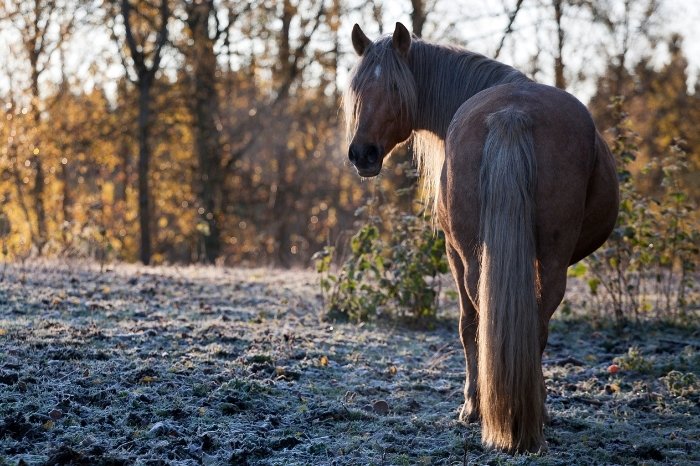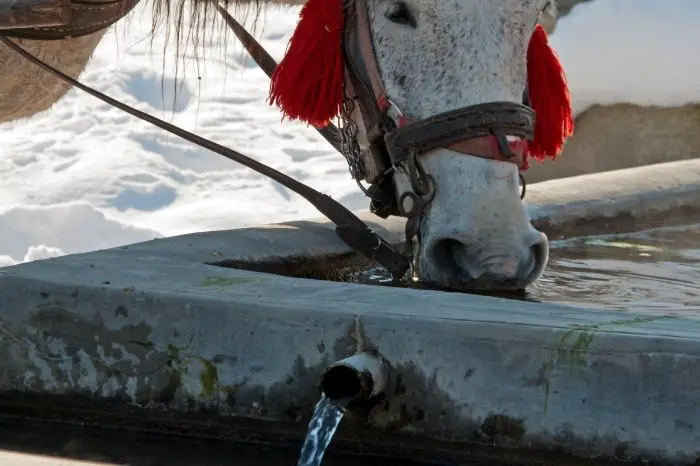Last Updated on May 26, 2022
Horses are tough animals that live in all sorts of climates across the world. So, how do horses handle the cold? Though they are hardy animals, they do have limits to how cold they can handle.
There are a few factors of how well horses can handle cold weather. In addition, some horses are better at handling cold temperatures than others. Their winter coats, age, body condition, feet and legs, and anatomy all contribute to their ability to deal with winter.
How Do Horses Handle The Cold?
Horses are amazing creatures in many ways. Their bodies are made to change during winter so they can handle cold temperatures and maintain their body condition.
Horses are capable of surviving temperatures as cold as -40 degrees Fahrenheit. However, not every horse is capable of handling such frigid temperatures.

Winter Coats
Every year, horses will grow winter coats to provide them with insulation and warmth during the winter months. As the nights become shorter, a horse will naturally begin to grow a longer coat.
The winter hairs will stand up and be thick like a down-filled comforter, with excellent insulation. How much hair a horse grows during winter will depend on where they live. Horses that live in areas with mild winters will only grow a light winter coat, whereas horses that live in areas with extreme cold will grow thick, dense winter coats.
The natural oils produced in the coat help horses shed moisture. If a horse is in a snowstorm in cold temperatures, the moisture from the snow freezes on the outer surface of the coat, never reaching the horse’s skin. A heavy winter coat creates insulating air pockets that help prevent body heat to escape, so the snow won’t melt or make him wet.
Feet And Legs – How Do Horses Handle The Cold?
Horses’ hooves and legs are designed to be able to stand in cold, deep snow without making the rest of the body freezing cold. This is in part to the fact that horses do not have muscle masses below the knee or hock. Tendon and bone, which is what a horse’s legs are mostly made of, are able to withstand the cold much better than muscles.
Age And Body Condition
A horse’s age and body condition also reflect how they handle the cold. Horses with adequate nutrition begin to build a layer of fat under the skin when nights grow colder. Some horses put on fat readily, while older horses tend to need more calories to gain the extra weight and body fat.
Horze Avalanche 1200D Ripstop Lightweight Horse Rain Blanket with Fleece Lining
Respiratory System
A horse’s respiratory system is designed to warm the air they breathe in, helping them better manage the cold. This reduces cold stress on the lungs.
Digestive System – How Do Horses Handle The Cold?
Providing a horse with a steady intake of hay or grass throughout the day is important in winter. Regular intake of hay throughout the day provides a horse with a constant source of heat energy.
Circulatory System
To move heat around the body, horses have a large circulatory system. In cold temperatures, horses are designed to retain heat, rather than dissipate it.
Click Here to Get Info About:
How To Take Care Of Your Horse In Cold Temperatures
If you live in an area with cold temperatures, it is important to know how to properly care for your horse in winter. Horses may need adjustments in their lifestyle during winter to help them thrive.
Provide Covered Shelter
In winter, it is important that you provide your horse with covered shelter so they can have protection from the elements. This includes a stall or run-in shed to provide protection. Though horses are generally able to tolerate cold temperatures, wind and moisture are more challengings for them.
Blanket Your Horse If Need Be – How Do Horses Handle The Cold?
Some horses should be blanketed during winter. Not only can blankets keep horses warm, but they can also keep horses dry as well.
Though blanketing is not always necessary, you should blanket horses that are body clipped or winter clipped for showing, not acclimated to the cold, have poor body condition or may get wet. In addition, foals and senior horses should be blanketed as well as horses sensitive to the cold. If you are turning horses outside in temperatures five degrees Farenheit and below with no shelter, they should be blanketed.
Increase Hay Intake
In some cases, increasing hay intake in winter can be beneficial to horses. They should have high-quality hay in order for them to have a constant source of heat energy and maintain their body condition.
Provide Fresh Water, Not Ice – How Do Horses Handle The Cold?
Horses need to drink additional water during winter as they are more at risk for impaction colic. Be sure to regularly check water buckets and troughs for ice and remove ice from the water source. Ideally, keep water temperatures between 45 to 65 degrees Fahrenheit if possible as many horses do not like to drink cold water as it chills them.

Keeping Your Horse Happy And Healthy During Winter
Horses are hardy animals, capable of withstanding temperatures as cold as -40 degrees Fahrenheit. They grow thick winter coats during winter to help stay warm and insulated from the cold.
Do you have any questions regarding how do horses handle the cold? If so, please ask any questions about winter care for horses in the comments.

